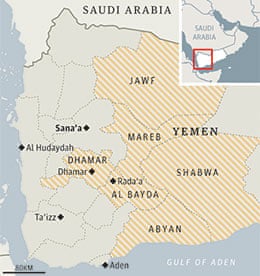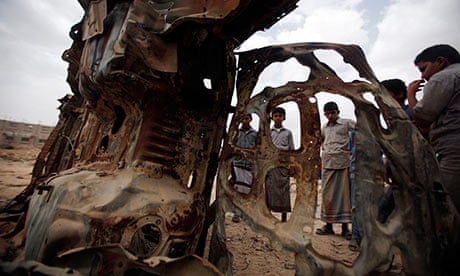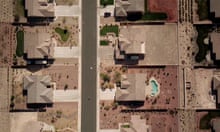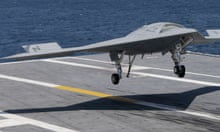Tiny, bright-red flashes twinkle in the night sky over Obeiraq, accompanied by a short, sharp detonation then a heavy thud. It shakes the houses and their windows. Smoke rises from the valley below. It makes the women "sick" and they stay indoors, but the menfolk strut around in the streets, flaunting their indifference to the unmanned aircraft. "We're not afraid of drones," they say.
Obeiraq, population 2,500, stands at the eastern extremity of Dhamar province, 150km south-east of the capital of Yemen, Sana'a. Its rocky volcanic landscape, peppered with fragrant shrubs, and surrounded by an unbroken chain of mountains, is a battleground for drones.
For the past year the neighbouring governorate of al-Bayda has been constantly targeted by US drones. Other provinces – Abyan, Shabwa, Mareb and Jawf – have suffered a similar fate. Rada'a and Manasseh, outposts in eastern Yemen for al-Qaida in the Arabian Peninsula (AQAP), have been besieged by the Yemeni military for months. Every now and then one or the other side claims victory. Obeiraq is just on the edge of this deluge of firepower.

Standing in a doorway a policeman is questioning an Ethiopian migrant who entered Yemen illegally. Tapping him on the shoulder, he asks: "Where are you going next? You're not going to become a terrorist?" The man shakes his head. "OK, we'd better take care of you," the officer concludes. In the middle of the main square a local man points to a long-haired motorcyclist carrying a Kalashnikov, claiming he is an AQAP combatant. Everyone smiles. The supposed terrorist offers us a ride to take a closer look at the fighting round Manasseh, then rides off on his own.
At Obeiraq there are pylons but no electricity, mains but no running water and a large number of pupils crammed into just one school. The village has no health facilities. The rutted tracks should have been tarmacked long ago.
Officially the most recent attack on Rada'a was on 20 May, ending a three-week break in hostilities to allow time for "national dialogue" in the capital, supposed to solve the country's problems. At Obeiraq there are no soldiers to be seen, no wrecked houses. Visually the war is elsewhere, but it is omnipresent in people's minds. When the people of Manasseh took flight in January, on foot or in their pickups, they thought there was some escape. But the war found its way into their hastily packed belongings. More than 70 families landed in Obeiraq, but there are only about 35 left, roughly 300 people in all. Of course Baraka is relieved at no longer having to hide in the caves or venture home to fetch a bag of flour or dried vegetables. The old woman knows the drones will not kill her here. She is safe in the home of a cousin. "I was sick there," she says, "and I'm sick here. Sick of the noise, at the thought of what has become of those who stayed behind, at the thought of my home. I'm 100, you know. I'm tired and sick." She rests on a stick, her deeply lined face surrounded by a brightly coloured shawl, typical of this remote part of Yemen. She is certainly old, but probably not quite as old as she makes out.
Dr Abdullah al-Hada, the technical head of the hospital in Dhamar, 40km away, has met about 20 "sick" people, odd patients unlike those he usually sees. He recalls the young adults who turned up in February and March, "when the fighting was bad. They were affected by these explosions which happen suddenly," he explains. He directed them to the emergency ward run by Dr Muhammad al-Asouadi. "They were trembling and couldn't sleep. The same symptoms affected civilians and soldiers. They spoke of being bombed, of burns and destruction." Al-Asouadi still remembers the suffering expressed by Yemeni soldiers "as they described their comrades killed in battle and asked who would take care of their families if they too were killed". None of them – neither civilians nor soldiers – has returned since. Al-Hada recalls phone conversations with friends who have stayed behind in Rada'a: "Right away they say: 'Yes, we're OK, but the drones ... tonight they're flying over the village.' The drones, it's like sitting next to someone playing with a revolver. You're afraid it may go off at any moment."
Non-governmental organisations have reported a dozen drone attacks in al-Bayda over the past year, with an unofficial toll of several dozen dead or injured, and hundreds of refugees. It is only unofficial because neither the Yemeni authorities nor the US administration release any information on the drone war.
At the peak of the fighting in January there were sometimes several strikes a day, "from mid-afternoon to dawn", local people say. That is why Baraka moved to Obeiraq with her daughter and son-in-law. Because the two villages are close, the people of Manasseh have close links with their Obeiraq neighbours. Obviously they moved there when the need arose, and they can go back occasionally to keep an eye on their flocks and crops. At the same time it is far enough away to afford a degree of safety. They were offered houses that were either vacant or under construction, with no roof and just a beaten earth floor. Others have taken refuge with relations, camping in the main room of the dwelling.
Many of the refugees gather at Khaled's home, engaging in lively discussion. "I assure you, the young men of Obeiraq may soon be joining AQAP," says Hamid Ahmad Wassel, 40, a village councillor.He also serves as a magistrate. People turn to him to settle disputes or for advice. Nothing that is said in Obeiraq seems to escape him. "The young men may soon turn to AQAP, because the combatants stand to gain a lot," he adds, obsessed by the lights burning at Rada'a and Manasseh. Obeiraq has always lived in darkness, but the nearby AQAP outposts, to which the government now pays much more attention, are brightly lit. "I've been waiting for electricity for years, like the roads," Wassel goes on. He produces a file containing a lengthy exchange of letters, with the provincial authorities and central government, regarding the shortcomings of his village's infrastructure. The letter officially confirming plans to build new roads dates from April 2006. The dirt tracks are still there. The oldest letters go back to 1990.
"I don't understand," he insists. "Must you be a terrorist to get electricity and running water? Is it a sort of reward? Here, we're too nice, so the government forgets about us. We have supported the government ever since the 1962 revolution, our region is peaceful. But there are already people here saying we should do something to attract the authorities' attention, like acts of sabotage or joining AQAP."
So is kindness the cause of all their ills? Ahmad Ali, also from Obeiraq, thinks so. "The regions with senior officials get almost everything, but here we have no government officials," he explains. "In the villages held by AQAP, the government laid on electricity in a week. All the regions which defied the authorities now have public services. We did nothing, so we get nothing." A neighbour, Ahmad Abdallah Ahmad, is not so sure: "We don't uphold the same principles as AQAP, you know, nor their view of how to apply sharia [law]. Obeiraq mustn't get mixed up in that."
But the villagers are visibly in two minds. A young Yemeni journalist, aged 23, who was partly educated thanks to US co-operation, went all the way to Washington to testify before the Senate judiciary committee on 23 April: "My name is Farea al-Muslimi. I am from Wessab, a remote mountain village in Yemen, about nine hours' drive from my country's capital, Sana'a. Most of the world has never heard of Wessab. But just six days ago, my village was struck by a drone, in an attack that terrified thousands of simple, poor farmers. The drone strike and its impact tore my heart, much as the tragic bombings in Boston tore your hearts and also mine." Al-Muslimi had been asked to give testimony on the drone war, but he never imagined he would talk about the village where he was born.
On 17 April a strike eliminated Hameed al-Radmi, a suspected AQAP recruit, and four other people. Wessab, a quiet village at the western end of Dhamar, suddenly became part of the drone war. "The farmers in my village were angry because Al-Radmi was a man with whom government security chiefs had a close connection," Al-Muslimi told the hearing. "He received co-operation from and had an excellent relationship with the government agencies in the village. This made him look legitimate and granted him power in the eyes of those poor farmers, who had no idea that being with him meant they were risking death from a US drone."
But, he added, "there is nothing villagers in Wessab needed more than a school to educate the local children or a hospital to help decrease the number of women and children dying every day. Had the United States built a school or hospital, it would have instantly changed the lives of my fellow villagers for the better and been the most effective counterterrorism tool. And I can almost certainly assure you that the villagers would have gone to arrest the target themselves."
On the hillside above Obeiraq goatherds are driving their flock towards a drinking trough. They disregard pressing calls to take cover and the increasingly violent firefight just a few hundred metres away. The noise of drones has become a habit. They simply count them as they hurtle overhead.
"My pupils talk of nothing else. They ask me to explain this war going on next door," says the schoolteacher Muhammad Musli. His 50 pupils, aged 13 to 15, turn up each morning with "puffy eyes and scared looks: they think the school may one day get hit", he adds. They ask about "this weapon they cannot see, which attacks innocent people and all those who have had to leave their homes". In an essay, Ali, 15, wrote about the "wild birds". He is from Manasseh. "Before they were free," Musli recalls, "they would play outdoors till nightfall. Now they go home before dusk." Much as everyone else. At dusk the people of Obeiraq leave their fields. Even the streets are empty.
Barack Obama promised stricter rules for drone strikes in May to limit civilian victims. Terrorists should be arrested if possible, not eliminated. So far little has changed in Yemen.
This article appeared in Guardian Weekly, which incorporates material from Le Monde



Comments (…)
Sign in or create your Guardian account to join the discussion